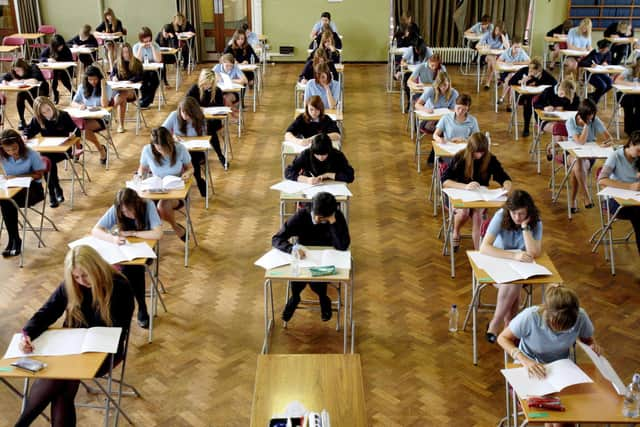New A-level grading pushes Sheffield pupils further behind their peers
and live on Freeview channel 276
Exams were cancelled amid the coronavirus pandemic and, following a U-turn, students were given a choice of their predicted grades or ones calculated by an algorithm.
The Sutton Trust said the regional inequalities seen in the marks suggests that pupils may have been disadvantaged by their postcode, calling the issue the "new frontier" of inequality.
Advertisement
Hide AdAdvertisement
Hide AdDepartment for Education figures show 1,971 students in Sheffield took A-levels in 2019-20 – with 21% receiving three A* or A grades, 30% AAB or better and 89% at least two A-levels.


The proportion getting A*-As was much higher than the 13% of pupils who achieved the same result under normal circumstances the year before, but the gap to the best performing parts of England has grown.
In 2018-19, Sheffield was 17 percentage points behind Reading, but this grew to 24 this summer.
Excluding Knowsley, which has just a few A-level students, the divide between the highest and lowest ranked areas across England rose from 28 percentage points in 2018-19 to 37 in 2019-20.
Advertisement
Hide AdAdvertisement
Hide AdThousands of A-level students originally had their results downgraded by an algorithm on results day, before Ofqual allowed them to use whichever mark was higher – their school's prediction or the calculated grade.
Before the U-turn, private schools saw a bigger increase in top A-level marks prompting sector leaders to suggest they may have benefited under the model from smaller class sizes.
But the new figures show private schools still saw a much larger rise in the best grades (11%) than state schools (6%), and sixth form and other further education colleges (4%).
Loic Menzies, chief executive of the Centre for Education and Youth, said: "The summer's exam chaos came on top of a lockdown that played out very differently for young people, depending on where they lived and how well off their parents were.
Advertisement
Hide AdAdvertisement
Hide Ad"It is therefore deeply worrying – but unfortunately unsurprising, that this has played out in regional inequalities when it comes to exam results – despite the Government's stated commitment to 'levelling up'."
In Sheffield, 30% of children achieved grades of AAB or better in the most recent academic year – up from 20% the year before.
But the gap to Reading, which was again the top area in this measure, grew from 19 to 27 percentage points.
The Sutton Trust said the new data furthers their concerns that high-attaining, lower income students lost out the most.
Advertisement
Hide AdAdvertisement
Hide AdJames Turner, chief executive of the charity, said: "It is also troubling to see a big increase in the regional divide for top grades, suggesting that pupils may have been disadvantaged by their postcode. This regional disparity is fast becoming the new frontier of educational inequality.
“It is imperative we avoid a similar situation this year. Contingency plans should be in place if exams can’t go ahead in the summer, including ongoing assessment through coursework, or benchmarked assessments set by exam boards in the place of mock exams, which are too inconsistent to be reliable.
“And more than ever in this time of upheaval, universities need to make offers to students that reflect the very different challenges they have faced.”
A DfE spokesman said: “Exams are important in judging a pupil’s performance and this data reflects the unprecedented circumstances faced this year. That is why Ofqual and the Government agree that exams should go ahead next year.
Advertisement
Hide AdAdvertisement
Hide Ad“Exams give all pupils the best possible opportunity to demonstrate their ability and achieve the results they deserve, no matter what their background."
In these confusing and worrying times, local journalism is more vital than ever. Thanks to everyone who helps us ask the questions that matter by taking out a digital subscription or buying a paper. We stand together. Nancy Fielder, editor.
Comment Guidelines
National World encourages reader discussion on our stories. User feedback, insights and back-and-forth exchanges add a rich layer of context to reporting. Please review our Community Guidelines before commenting.